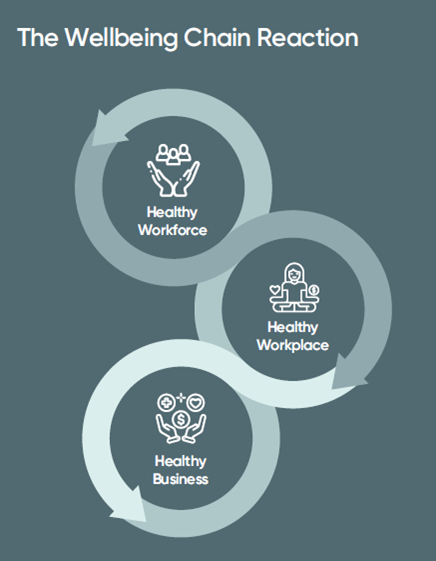Reading Time: 5 minutes
Employee well-being is a critical aspect of any successful organization. It refers to an employee’s physical, emotional, and mental health and ability to function effectively. When employees feel good and are healthy, they are more productive and engaged in their work, which benefits both the employee and the organization.
Employee productivity is a crucial factor in any organization’s success, but it can be impacted by various factors, just like any other aspect. Unfortunately, the current recession and job insecurity in the economic climate have made it particularly challenging.
In light of these challenges, examining how they affect employees and exploring potential solutions organizations can adopt to alleviate these issues is essential.
Impact of the recession on employees
Job Security
The current uncertainty can make employees feel more anxious or stressed about their job security, financial stability, etc. This can lead to declining mental health as employees worry about layoffs or budget cuts. In addition, the uncertainty of an economic downturn can also cause employees to feel less confident about their future, which can further aggravate anxiety and stress.
Employee well-being can no longer be seen as a passing fad; it requires consistent attention and improvement. Despite a significant increase in the Workplace Wellness Index in the previous year, 2023 has seen a 2-point decline in perceptions. Organizations must collectively drive well-being efforts to create a healthy workplace for all.

Effect on work-life balance
Another way a recession can impact employee well-being is its effect on work-life balance. For example, employees may be less likely to take time off work, even when feeling unwell, due to fears about job security. This can lead to employees becoming burnt out and overwhelmed as they work long hours without taking breaks or vacations. In addition, employees may be required to take on additional responsibilities at work due to budget cuts or downsizing, leading to even more stress and pressure.
Reduced Job Satisfaction
Reduced job satisfaction during a recession stems from several critical factors. As companies downsize to cut costs, remaining employees often face increased workloads, leading to burnout and fatigue. The added responsibilities without corresponding support or resources amplify stress levels, making it difficult for employees to maintain high performance and job satisfaction.
Additionally, career advancement opportunities become scarce as organizations tighten budgets and freeze promotions or new roles, which can demotivate employees seeking growth and development in their careers. Companies may also reduce benefits and perks as part of cost-saving measures. The loss of these incentives, such as health benefits, bonuses, and wellness programs, directly impacts employees’ sense of value and satisfaction with their job, further eroding their overall well-being and commitment to the organization.

Employee Engagement
During a recession, employee engagement often suffers due to widespread uncertainty and dissatisfaction. Concerns over job security and financial stability can preoccupy employees’ minds, leading to lower engagement levels. This pervasive sense of uncertainty can diminish motivation, as employees might feel their efforts could be more valued or that their future with the company could be more secure. Consequently, productivity can decline, as disengaged employees are less likely to go above and beyond in their roles.
Moreover, maintaining a positive workplace culture becomes increasingly challenging. Economic hardships can force companies to make difficult decisions, such as reducing benefits, freezing promotions, or even laying off staff. These actions can create a negative atmosphere, eroding trust and morale. Leaders must work harder to communicate transparently foster a supportive environment to mitigate these effects, and strive to keep the workforce engaged and motivated.
Financial Strain
Financial strain during a recession significantly impacts employees and their work performance. Personal financial difficulties, such as reduced income, increased debt, or the loss of a partner’s job, can create significant stress and anxiety. These pressures can distract employees, making it hard for them to concentrate on their work and maintain productivity levels.
Stress-related health issues, like anxiety, depression, or physical ailments, often increase absenteeism as employees take time off to manage their well-being or personal financial matters. This absenteeism can disrupt workflow and burden other team members, further affecting overall productivity and morale.
Additionally, the search for financial stability can drive higher turnover rates. Employees may leave their current positions for opportunities perceived as more secure or better paying, seeking to mitigate their financial stress. This turnover can lead to loss of institutional knowledge, increased recruitment costs, and further strain on remaining employees, perpetuating a cycle of stress and decreased organizational performance.
How companies can provide organizational support and convenience
The current economic climate has created a challenging environment for many employees. As companies face these challenging times, they need to recognize their impact on their employees and take proactive steps to support their well-being.
Take proactive steps to understand how your employees are doing.
The first step is for companies to understand how their employees are feeling. Conducting a well-being survey can help organizations assess the level of stress and anxiety their employees are experiencing and identify the areas where they need to focus their attention.
Additionally, companies should ensure that their employees know the types of employee assistance programs available. These programs can provide employees with access to 4ounselling services, financial advice, and mental health support, which can be especially helpful during times of stress and uncertainty.

Prioritizing management of talent
Companies should prioritize the management of their current talent. Many organizations focus heavily on hiring the needed talent but fail to manage and support their existing employees adequately. By offering training and development opportunities, companies can help their employees grow and develop their skills, increasing job satisfaction and reducing the likelihood of them leaving the company.
Lay more focus on transparent communication
Communication is also critical during times of economic uncertainty. Companies should communicate consistently and transparently with their employees to keep them informed about the company’s financial situation, the impact of the recession, and any measures it takes to support its employees. Regular updates and addressing employees’ concerns can help reduce anxiety and increase job satisfaction.
Fostering a positive workplace
Furthermore, companies can create a positive work environment that supports employee well-being by implementing flexible work arrangements. For example, allowing employees to work from home or providing flexible hours can help employees balance work and personal responsibilities, reducing stress and improving well-being.
Employee well-being is critical to any successful organization and can be severely impacted by recession or other economic challenges. However, by taking proactive steps to support employee well-being, including regular check-ins, transparent communication, and promoting work-life balance, organizations can help employees weather these challenges and emerge more robust and resilient.

Visit us Here to learn more about how you can align your strategies with your employee’s well-being.











